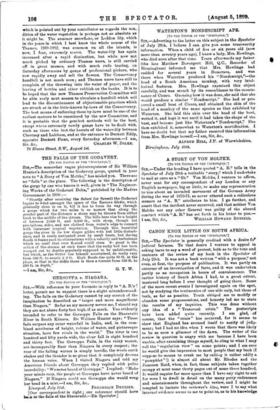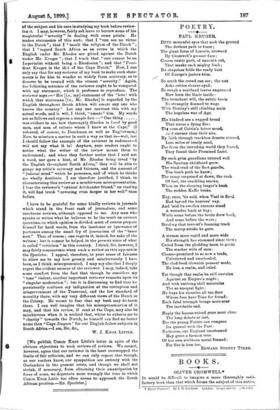CANON KNOX LITTLE ON SOUTH AFRICA. [To THE EDITOR OF
THE `;SPECTATOR."] SIR,—The Spectator is generally credited with a desire for judicial fairness. To that desire I venture to appeal in asking leave to say a word of protest, both as to the tone and contents of the review of my book in the Spectator of July 29th. It was not a book written " with a purpose,!' not even, at first, the purpose of publication. It was partly an outcome of an investigation of facts, and it was undertaken partly as an occupation in hours of convalescence. The earlier history of South Africa I bad, to a great extent, mastered long before I ever thought of going there. Some of the more recent events I investigated again on the spot, not by studying the testimonies of one side only, but those of both, as far as possible. Truth obliged me to modify or abandon some prepossessions, and honesty led me to state the results of my inquiries. This was done without any idea of a " Transvaal crisis." The postscripts have been added quite recently. I am glad, • of course, that the "crisis" has occurred, for it seems to show that England has aroused itself to sanity of judg- ment; but I had no idea when I wrote that there was likely to be so soon a glimmer of the dawn. The writer of the review in question is angry with me because I have been unable, after examining things myself, to cling to what I may call the "regulation view" on some points; and I am sure he would give the impression to most people that my book (I suppase be means to crush me by calling it rather oddly a " pamphlet" !) is almost all about Mr. Rhodes and the Jameson Raid, when, in fact, those subjects taken together occupy at most some thirty pages out of some three hundred. It would require far more apace than I have any right to ask for were I to dwell in detail on the many petty rndenesses and misstatements throughout the review, and I might be tempted to imitate the reviewer's l',,3tar, were I to say what internal evidence seems to me to point to, as to his knowledge
of the subject and his care in studying my book before review- ing it. I may, however, fairly ask leave to borrow some of his magisterial " severity " in dealing with some points. He makes statements of this sort; that I "can see no virtue in the Dutch"; that I "insult the religion of the Dutch "; that I "regard South Africa as an arena in which the English under Mr. Rhodes are pitted against the Dutch tinder Mr. Kruger "; that I teach that "one cannot be an Imperialist without being a Rhodesian "; and that "Presi- dent Kruger is the idol of the Cape Dutch." Now, I can only say that for any reviewer of my book to make such state- ments is for him to wander so widely from accuracy, as to deserve to be treated with the utmost " severity.? Again, the following sentence of the reviewer ought to be compared with my statement, which it professes to reproduce. The reviewer says :—" His [i.e., my] statement of the love! with which that statesman [i.e., Mr. Rhodes] is regarded by the English throughout South Africa will amaze any one who knows the country." Let any one contrast this with my actual words, and it will, I think, "amaze's him. My words are as follows and express a simple fact :—" One thing was evident to me, how thoroughly Rhodes is loved by good men, and men of culture whom I knew at the Cape," (I referred, of course, to Dutchmen as well as Englishmen,) Now, to misstate a matter in such a way as that ia—well, lest I should follow the example of the reviewer in rudeness—I will not say what it is I Anyhow, your readers ought to notice what the writer of the review means them to understand; and when they further notice that I said not a word, nor gave a hint, of Mr. Rhodes being loved " by the English throughout South Africa," they will be able to gauge my critic's accuracy and fairness, and the amount of "judicial mind" which he possesses, and of which he thinks me wholly destitute. I am therefore justified, I think, in characterising this review as a mischievous misrepresentation. I fear the reviewer's "cynical Afrikander friend," on reading it, will find truth q cowering even deeper in her well's than before.
I have to be grateful for some kindly reviews in journals which stand in the front rank of journalism, and some courteous reviews, although opposed to me. Any man who speaks or writes what he believes to be the truth on current questions, on which opinion is divided. must of course prepare himself for hard words, from the insolence or ignorance of partisans among the small fry of journalism of the " baser sort." That of course; one regrets it, indeed, for sake of the writers ; but it cannot be helped. in the present state of what is called " criticism" in this country. I think, Sir, however? I may fairly remonstrate when such a review as this appears in the Spectator. I appeal, therefore? to your sense of fairness to allow me to say how grossly and mischievously I have been, as I think, misrepresented, I may say also that I deeply regret the evident animus of the reviewer. I may, indeed, take some comfort from the fact that though he considers my "tone" violent, another important reviewer remarks upon its "singular moderation "; but it is distressing to find that he persistently confuses my indignation at the corruption and misgovernment of the Transvaal, and the low standard of morality there, with my very different views of the Dutch in the Colony. He seems to fear that my book may do harm there. I can well imagine that his misrepresentation of it may, and that his review, if read at the Cape, may also be mischievous when it is noticed that, whilst be exhorts me to "charity" towards the D utch, he himself can find no better name than "Cape Jingoes " for our English fellow-subjects in South Africa.—I am, Sir, &c., W. J. KNox LITTLE.
[We publish Canon Knox Little's letter in spite of the obvious objections to such reviews of reviews. We cannot however, agree that our reviewer in the least overstepped the limits of fair criticism, and we can only repeat that though, as our readers know, our sympathies are entirely with the Outlanders in the present crisis, and though we shall not shrink, if necessary, from obtaining their emancipation by force of arms, we deprecate most strongly the tone in which Canon Knox Little too often seems to approach the South African problem.—ED. Spectator.]



































 Previous page
Previous page